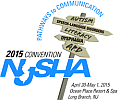Effects of Fast Mapping in Children With Cochlear Implants
Thursday, 11:00am to 1:00pm
Seabright
Poster 1
In this study, the fast mapping skills of a child implanted during the sensitive period of language acquisition was compared to a child implanted after the sensitive period of language acquisition. Fast mapping is a hypothesized process enabling children to rapidly learn new vocabulary having only brief exposure to a word and its referent. Children were observed for three sessions. During the training phase, the principal investigator determined which words were familiar and unfamiliar. During the exposure phase the participants played briefly with objects that represented target words and selected target objects as they were named by the principal investigator. The generalization phase followed the same format as the exposure phase; however, this phase determined if the unfamiliar words were retained from previous sessions. The time allotted between the exposure phase and generalization phase was two weeks. Both children demonstrated increased knowledge of unfamiliar words, although the child implanted during the sensitive period of language acquisition obtained a higher percentage score than the child implanted after the sensitive period of language acquisition. Future research in the area of fast mapping with children who utilize cochlear implants is warranted to achieve more definitive conclusions.
Track:
Pediatric
